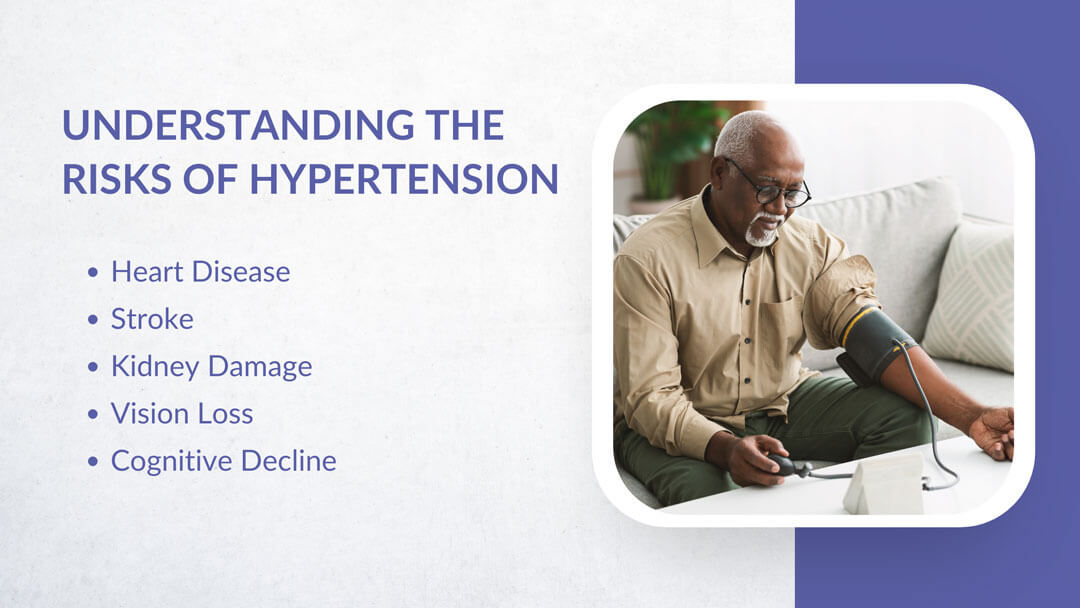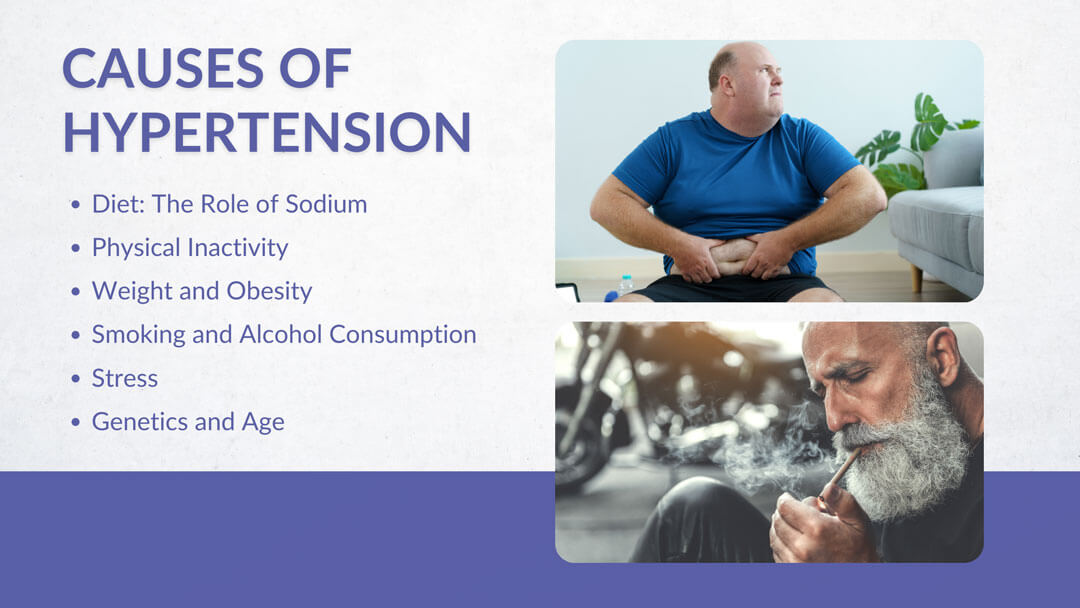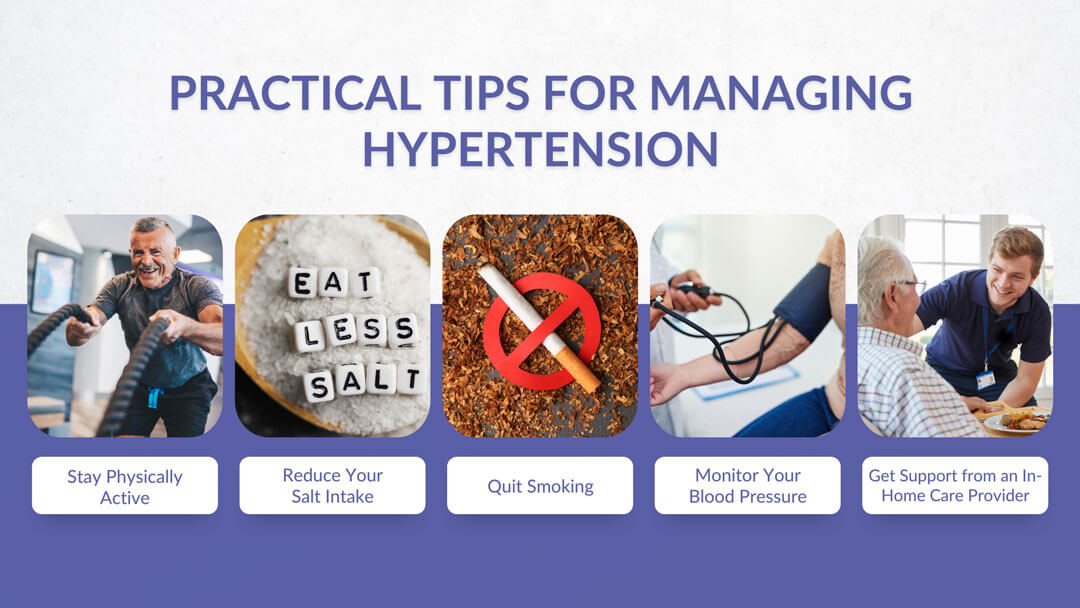Heart Health: Tips for Managing Hypertension

As we age, maintaining heart health becomes increasingly vital. One primary concern is high blood pressure or hypertension, a condition where the force of blood against artery walls is consistently too high. Left unchecked, hypertension can lead to severe health issues like heart attacks, strokes, kidney problems, and vision loss.
Table of Contents
Hypertension: The Silent Threat
Often called the “silent killer,” high blood pressure can go unnoticed until it causes significant damage. Regular blood pressure monitoring is essential for early detection and management. Readings consistently at or above 130/80 indicate hypertension. While medications can help manage it, lifestyle changes play a crucial role in keeping blood pressure under control.
Understanding the Risks of Hypertension

Hypertension significantly increases the risk of several health problems, particularly in seniors:
- Heart Disease: High blood pressure can harden and thicken the arteries, leading to heart disease or heart failure. This added strain can cause the heart to enlarge and struggle to pump blood effectively.
- Stroke: Hypertension can cause blood vessels in the brain to burst or become blocked, resulting in a stroke, which can lead to severe disability or death.
- Kidney Damage: High blood pressure can damage the blood vessels in the kidneys, impairing their ability to filter waste from the blood, potentially leading to chronic kidney disease or failure.
- Vision Loss: Damage to the blood vessels in the eyes caused by high blood pressure can result in vision problems or blindness, known as hypertensive retinopathy.
- Cognitive Decline: There is evidence that hypertension contributes to cognitive decline and dementia in seniors, affecting daily life and well-being.
Recognizing these risks underscores the importance of managing hypertension through both medical and lifestyle interventions.
Causes of Hypertension

Hypertension develops when the force of blood against your artery walls is consistently too high. Understanding the contributing factors can help in managing and preventing it:
- Diet: The Role of Sodium: High sodium intake is a significant risk factor. Sodium causes the body to retain fluid, increasing blood volume and pressure. Processed foods and restaurant meals often contain high levels of sodium. Reducing sodium by choosing fresh foods and cooking at home can lower blood pressure.
- Physical Inactivity: Lack of exercise can lead to weight gain, putting extra strain on the heart. Regular physical activity helps maintain healthy blood vessels and improve blood flow. Aim for at least 30 minutes of moderate exercise most days of the week.
- Weight and Obesity: Excess weight increases the blood volume your heart must pump, raising blood pressure. Losing even a small amount of weight can improve heart health.
- Smoking and Alcohol Consumption: Smoking constricts blood vessels and raises blood pressure, while excessive alcohol consumption can also elevate blood pressure. Quitting smoking and limiting alcohol intake are essential for managing hypertension.
- Stress: Chronic stress can increase blood pressure temporarily and promote unhealthy coping mechanisms like overeating and smoking. Managing stress through relaxation techniques and healthy lifestyle choices can help lower blood pressure.
- Genetics and Age: Genetics and aging play significant roles in hypertension development. Family history and age-related changes in blood vessel elasticity can increase risk. Regular monitoring and healthy lifestyle choices are crucial.
Practical Tips for Managing Hypertension

Incorporating lifestyle changes can significantly improve health and control hypertension:
- Stay Physically Active: Aim for at least 30 minutes of moderate activity five days a week. Walking, jogging, biking, swimming, or joining a dance class can help. Combine cardio and strength training for optimal results. Consult your doctor for personalized exercise recommendations.
- Reduce Your Salt Intake: Keep sodium intake around 1,500 mg or less daily. Read food labels and avoid processed foods. Opt for a well-balanced diet consisting of fresh fruits, vegetables, lean meats, and whole grains. Use herbs and spices instead of salt for flavor.
- Quit Smoking: Quitting smoking can greatly benefit your health. Nicotine constricts blood vessels, making the heart work harder. Combined with high blood pressure, smoking raises the risk of stroke or heart attack.
- Monitor Your Blood Pressure: Regularly check your blood pressure and track your readings. Note activities, stress levels, and other factors that might affect your readings. Share this information with your doctor.
- Get Support from an In-Home Care Provider: An in-home care provider can help manage heart health by reminding you to take medication, preparing meals, and encouraging physical activity. They also provide companionship and support.
Get Support from an In-Home Care Provider
An in-home care provider can be invaluable in managing your heart health. They can remind you to take your medication, help create and prepare a low-sodium diet, and encourage regular physical activity. Additionally, having a caregiver provides companionship and support as you navigate these lifestyle changes. Contact Always Best Care of Denver at (720) 310-6998 to learn more and schedule your free consultation.





